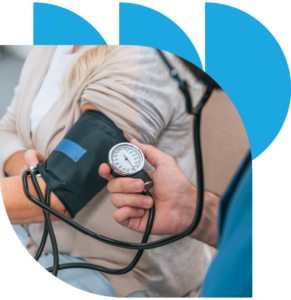
Beyond Brushing: Healthy Mouth, Healthy Body
Diet, exercise, and mental well-being are often the main focal points of maintaining your overall health, but one crucial aspect is sometimes overlooked: oral health.
While it’s easy to think of oral hygiene as just the upkeep of a sparkling smile and the prevention of cavities, there is actually a strong connection between oral health and other health concerns.

THE MOUTH-BODY
CONNECTION
Your mouth is not isolated from the rest of your body; it is a gateway to your systemic health. Oral health issues, particularly gum disease, have been linked to an increase in health concerns with chronic diseases, including diabetes and heart disease.
By neglecting oral health, you open yourself up to harmful bacteria that can cause inflammation and infection in your gums. These bacteria can then spread through your bloodstream, contributing to the onset and progression of systemic diseases.
FROM
CAVITIES TO CARDIOVASCULAR
Over the past few decades, research has increasingly highlighted the association between gum disease and heart health. So, how exactly does improper upkeep on brushing and flossing affect your heart?
Well, gum disease, which can be characterized by inflamed gums that may bleed during brushing or flossing, is a chronic inflammatory condition caused by bacterial infection of the gums and surrounding tissues.
Here’s how it happens:


Bacterial Spread:
The mouth contains numerous bacteria, and when gum disease is present, harmful bacteria can enter the bloodstream through inflamed gum tissues. They then travel like unwelcome guests to other areas, including the heart’s arteries.

Inflammatory Response:
The body’s immune system triggers an inflammatory response from bacteria. Chronic inflammation is a known risk factor for cardiovascular disease. Inflammation contributes to forming plaques in the arteries, a process known as atherosclerosis.

Atherosclerosis:
Atherosclerosis occurs when plaques build up inside the arteries, narrowing them and restricting blood flow. If a plaque ruptures, it can lead to a blood clot that may block an artery, causing a heart attack or stroke. The bacteria from gum disease can make things worse by promoting inflammation within the arteries.
While maintaining good oral hygiene isn’t a surefire way to prevent heart disease, it can be an extra step that can be easily followed to ensure good heart health.

DIABETES AND DENTAL HEALTH
What’s the link between oral health and diabetes? The main one is high blood sugar. For example, if your blood sugar isn’t correctly managed, oral health issues can arise, as diabetes can actually weaken white blood cells, which are the body’s main defence against bacterial infections in the mouth.
Now, how can poor oral hygiene negatively affect your diabetes? Studies have shown that tissue inflammation caused by bacteria can weaken the body’s ability to create and utilize insulin and control blood sugar.
This is where things come full circle since, as mentioned previously, high blood sugar can create the perfect conditions for bacteria to grow. The best way to combat this is to make frequent visits to your doctor and dentist and ensuring your glucose levels and oral health remain stable.
Brushing twice a day for two to three minutes at a time plus flossing beforehand helps to remove excess plaque and food particles and lessen the chance of bacteria forming. This can all help with diabetes and oral health.

LIVE A
HEALTHIER LIFE
It’s essential to recognize that oral health is not just having a bright smile; it’s a crucial component of overall health and well-being. The intricate connection between oral and systemic health underscores the importance of prioritizing dental care as part of a holistic approach to wellness.
Maintain Regular Checkups
Even while upholding the best oral hygienic routines, you still want to visit your dentist regularly for checkups and cleanings.
These are just a few things to keep in mind when thinking about your cleaning routine. The ThirtyTwo team is here to assist with any questions or concerns. Feel free to contact us today and schedule an appointment.
If you have any questions or concerns or would like to schedule an appointment, contact us today.
Book online, call, or email us for an appointment, anytime.